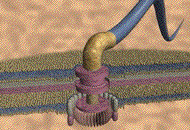First, some facts: The universe is more than a few thousand years old. Dinosaur bones were not planted by god to test our faith. We are related to monkeys. Okay, moving on...
Because the book is in Will's room, and Will isn't yet awake, I'll have to paraphrase something written by Richard Dawkins. He said something along the lines of "before Darwin, anyone who was an atheist wasn't paying attention". This implies, much like his books explicitly profess, that religion is inherently antiquated.
While I am inclined - and raised, and taught - to agree with Dawkins, I have to begrudgingly temper that with a concession to spirituality. Recognizing that it is, in fact, possible to believe in some higher power while simultaneously accepting scientific explanations for natural phenomena, I can't help but look at anatomy and physiology with a sense of wonder, a sentiment that can easily translate to faith.
The most macroscopic example I can think of is pennation, or the way muscles attach to tendons at an angle in order to increase their force production. Discussing this phenomenon in an Engineering class, it's inevitable to use words like "design", as in "the fiber arrangement in the calf is designed to maximize the force through the tendon". Note that this is grammatically comparable to, but conceptually independent of, something like "the arrangement is Intelligently Designed".
Then there is the ever-popular controversy over the origins of bacterial flagella. I despise the claim that the structure of the flagellum is "irreducibly complex", which asserts that there is no way something so utterly dependent on each of its constituent proteins could have evolved over time. People still stubbornly make this assertion, despite the overwhelming evidence to the contrary.
 If the existence of such contrary evidence will inherently lead to the undermining of their faith, then it isn't surprising that they're ignoring it. That said, you have to appreciate the beauty of this incredibly complex mechanism, which has been called "the world's most efficient motor". Yeah, that's right, you have to. Do it.
If the existence of such contrary evidence will inherently lead to the undermining of their faith, then it isn't surprising that they're ignoring it. That said, you have to appreciate the beauty of this incredibly complex mechanism, which has been called "the world's most efficient motor". Yeah, that's right, you have to. Do it.Or, if that doesn't do it for you, we can look a little deeper, at the membranes of mitochondria, where there exists another rotary complex of proteins. This structure is fueled by the flow of protons, and as it rotates, it drives a cam-shaft that re-energizes your ATP. Even if most of that sentence didn't make sense, it's worth repeating one part: there is a freaking cam-shaft, just like the one in your car, only this one's made of protein and is a few thousand times smaller and a few hundred thousand millenia older.
It boggles the mind, even at a glance... this, I think, is part of the reason that Creationism is so palatable to people. And here's another spin on it, an animation of cellular processes from the good folks at Harvard:
My favorite bit is at 1:17. I know you hate watching youtube videos, but indulge me on this one. We humans are fantastically good at anthropomorphizing what we see, and this little protein is no exception. What we're looking at is a molecule driven by chemical gradients and ATP dephosphorylation along an actin skeleton, the completely unconscious behavior of an automaton; what we see, though, is an animal trudging along a path, struggling to tow a massive load.
Unimaginably complex systems like this make it somewhat easy for me to put myself in the shoes of Creationsists - excuse me, Design Proponents. Like sequined, high-heeled galoshes, I think the shoes are ridiculous, but I have put myself in them just to see how they feel. Shouldn't it be even easier, though, to accept the scientific explanations - the theories that are rigorously tested, revised, and instantiated methodically?
One last thought. Creationists seem to have a big problem with the idea that life happened spontaneously, that the organic could be derived from the inorganic. While the window for that event was hundreds of millions of years wide, it was (at least intuitively) a low-probability event. The idea that life started by chance, that rather than being made in god's image we were the result of probabilities and mutations, must impart a sense of fragility.
Nobody likes feeling fragile.



3 comments:
The intelligent design and creationism crowds would argue that, the theory of evolution has been revised (updated) a number of times, but it has never been thoroughly tested. These thinkers mostly believe that microevolution exists, but an accelerated method for simulating and demonstrating the more fundamental steps in evolution (self-replication) would have to exist for them to believe that humans evolved out of "the primordial goo."
brilliant!!!!!!!!!!!!!!!!!!! my juevenile mind liked the video. geezz, 1 week into winter break and i digressed 15 years. awesome.
ps: have you heard the theory that dna came from the cellular structure of clay? just checking. got a book on it iff'n you wanit
Post a Comment